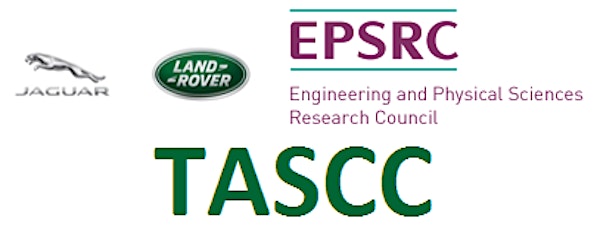
TASCC (Towards Autonomy, Smart and Connected Control) - EPSRC & JLR Joint Workshop
Date and time
Location
Radcliffe Conference Centre
University of Warwick Gibbet Hill Road Coventry CV4 7AL United KingdomDescription
The Engineering and Physical Sciences Research Council (EPSRC) and Jaguar Land Rover (JLR) will be holding a joint workshop to explore research opportunities in the area of smart and connected control around the central challenge of moving towards a fully autonomous car. The activity is part of the strategic partnership between Jaguar Land Rover and EPSRC. We anticipate that there may be a future funding opportunity in this research area, following the successful Programme for Simulation Innovation.
There will be a workshop on Tuesday the 9th December 2014 at the "Radcliffe" Conference Centre (University of Warwick campus, Coventry) for university researchers interested in the area of ‘towards autonomy – smart and connected control’. The workshop will include a mix of presentations, Q&A sessions and networking.
If you are interested in attending the event, please register asap.
Research scope
We are looking to see where expertise in the UK research community can address cross-disciplinary research challenges in three key areas:
-
Autonomous driving control
-
User experience in vehicles with autonomous intelligent features
-
Enabling technologies, processes and legal framework for autonomous vehicles
The research scope covers the following themes:
-
Human interaction - Understanding the role of the driver in an autonomous car and their interaction with the vehicle through appropriate interface technologies. A key challenge is to understand the psychology of the relationship of control between driver and vehicle and to manage the transfer of control between them.
-
Autonomous vehicle control - New dynamic control techniques for an intelligent, adaptive vehicle with predictive capability, integrating user patterns and real-time data. Systems engineering approaches and whole system-level understanding, optimisation and control.
-
Autonomous intelligent features - Autonomous control of vehicle features that are supplementary to driving, such as climate control, in-car entertainment, lighting and communications. Creating a personalised experience for the driver and passengers includes profile identification from integration of multiple sources such as key-fobs and consumer electronic devices. Research areas include intelligent methods and techniques for machine learning for vehicle systems configuration and adaptation, deep learning and pervasive listening, the self-learning car and digital integration with smart devices, wearables, home automation and the internet of things.
-
Data fusion & analytics - Efficient data capture, validation, processing, management and storage. Integration of data from multiple sources, both on-board and off-board, and real-time processing of massive data sets for knowledge extraction, decision making and intelligent vehicle capability. Includes integration of real-time data with learned user patterns and division of data processing logic and capacity between in-vehicle and off-board capabilities.
-
Sensing - New sensing technologies and the integration, optimisation and management of multiple sensors on a partially/fully autonomous vehicle. This includes sensor fusion, intelligent and pre-emptive sensing, and augmentation of sensed data with off-board data.
-
Off-board data & infrastructure - The fully autonomous car will need to communicate with its environment – with other cars and road users, with roadside infrastructure, and with external data services etc. This theme involves research into distributed systems architecture connecting the vehicle to the rest of the world. It includes both vehicle-to-vehicle and vehicle-to-infrastructure data sharing, and on- and off-board strategy for cloud integration.
-
Distributed systems & control architecture - The distributed system architecture of the vehicle. Architectures need to be integrated, flexible and scalable, providing the underpinning foundation enabling communication between many components and technologies. In the context of smart and connected vehicles, research includes software engineering, control architectures and physical electronic network architectures.
-
Verification, robustness & safety - The specific challenges that verification and validation of the design and robustness of autonomous vehicle systems to meet functional, legal and safety requirements brings.
-
Legislative framework - The legislative framework enabling autonomous vehicles to be legal (current legislation requires the driver to be in control at all times). Research includes the legal and ethical issues associated with autonomous driving, including responsibility and liability, regulation and standards, and validation that would be required for type approval etc.
Further information
If you have any questions about the workshop, please email Towards.Autonomy@epsrc.ac.uk.
Please register to attend the event. The event opganisers may exercise the need to limit attendee numbers per University if demand exceeds the supply of places. Preference will be given to workshop attendees who are eligible to apply for EPSRC funding.
Thank you and we look forward to the 9th!
EPSRC and Jaguar Land Rover (Research)